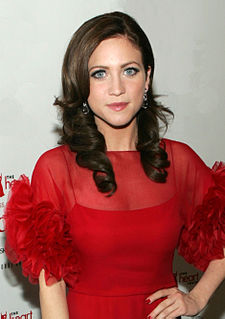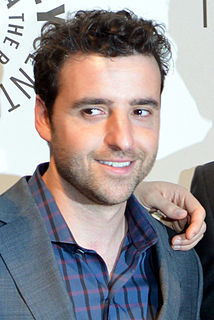A Quote by Veena Sud
I heard John Wells say something really smart, many years ago. He said, "Assume your audience is really intelligent. Assume that they are really smart, and tell your story that way." So, for me, it's about never assuming that they will go away because they're not entertained.
Related Quotes
I think most teen comedies are probably played in a way that aren't geared towards people that are wanting to be entertained but also [see] something that has a lot of heart to it. The things we do in the movie - it has a lot of heart, and also it's really smart. The people and the characters that we are, we're really intelligent people that are using our tactics to get back at a guy. The moral of being who you are, and trusting yourself, finding your inner strength - I think that's something that most teen movies don't really dial into.
There are a lot of smart people being really thoughtful and writing really interesting things, but that isn't what I want to do. It's never felt like what I've been called to do. And I have to risk sounding really arrogant when I say that because I've gone to Ivy League schools and been privileged in all these ways in the world of ideas, but I'm not as smart as you think. I'm not really depending on what I learned in college to write my books. Those were just parts of my life experience.
Fred Jr. Trump was great. He was the most handsome person. He was a really smart guy, really, really smart guy. He had everything. But at a certain age he started drinking a little more, a little more, and ultimately it was a big problem, and he'd say don't ever, ever drink. And I'll tell what you, I never - I have never had a glass of alcohol.
If I had a daughter, I would tell her certain things. I would tell her that it’s great to be smart, really smart - that being smart makes you strong. I would tell her that emotions are powerful, so don’t be afraid to show them. I would tell her that some people may judge you on how you look or what you wear - that’s just how it is - but you should keep your focus on what you say and do. I would tell her that she may see the world differently from boys, and that difference is essential and good.
My mind goes really quickly and I tend to talk really fast, as you've probably heard, I sometimes lose track of my syntax, as I'm talking that fast. The only thing I try to do, well, it's slow down, but also I do something when I'm reading that's similar to when I'm writing a section, which is to really try to imagine you on the other side, in a certain way, as an intelligent, sympathetic presence who's rooting for me to tell you a good story.
So many interviews, even ones that I consider really intelligent and good writers, will do the, like, 'Oh, you're not taking your clothes off like Miley Cyrus and all these girls' thing, which to me is just the weirdest thing to say to someone. ... Now when people are like, 'Tell me what you think of Miley!' I'll say, 'What do you think of Miley?' and they'll flounder and say, 'Well, I think she's really talented...' and I'm like, there you go.





































